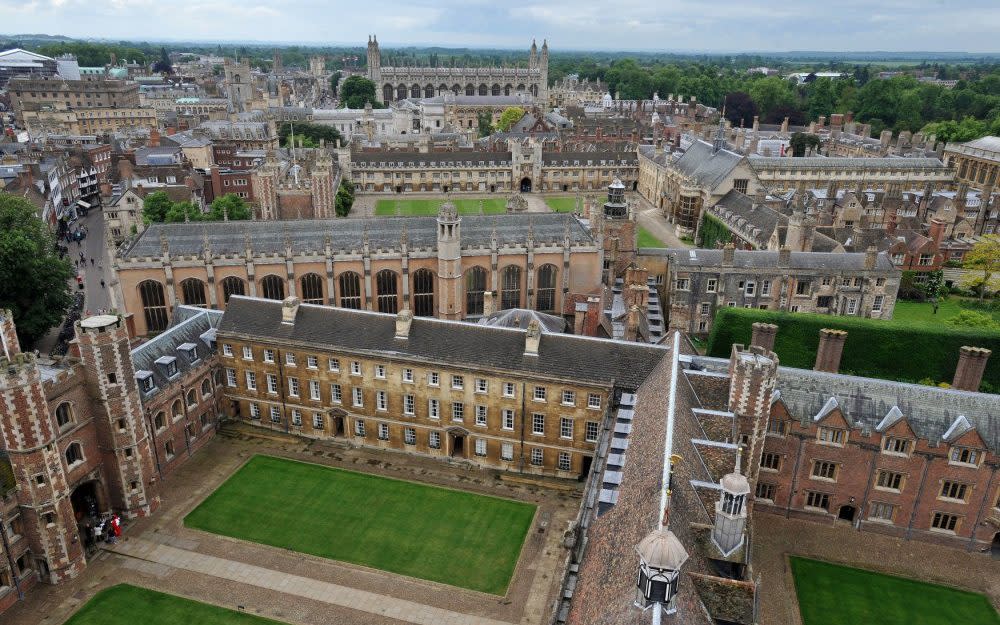Oxford and Cambridge are locked in death spiral of competitive intolerance

- Oops!Something went wrong.Please try again later.
- Oops!Something went wrong.Please try again later.
The Boat Race is no longer the primary source of contest between Oxford and Cambridge students – it is free speech. The world’s most preeminent universities are now locked in a doom spiral of intolerance as they attempt to outcompete each other: how hard, how fast, and how famous can their cancellations get?
Both universities have been listed among the “most restrictive” on matters of free speech by the think tank Civitas. In 2019, Canadian psychologist, Jordan Peterson, saw his fellowship rescinded by the Faculty of Divinity. John Cleese – a Cambridge alumni – cancelled his appearance at the Cambridge Union after the debating society initiated a “blacklist”. It has also become a matter of routine for students to rally against those with gender-critical views, with journalist Helen Joyce and writer Simon Fanshawe among those who have faced intimidation and cancellation.
And just last week, data scientist and demographer, Stephen J Shaw saw his documentary Birthgap – Childless World cancelled by Cambridge University students. The film explores the precipitous decline in the world’s birth-rate from both social and economic perspectives. Activists who deemed the documentary to be “anti-feminist” and “bigoted” wrote to faculties that had advertised the event, intending to guilt staff into contrition: they spurned Shaw in the student newspaper, attempted to book out tickets, and mounted an in-person protest. The threat of disruption was deemed too great and the venue – St. John’s College – “postponed” the film’s showing.
Loath to be outdone, however, students at the University of Oxford have gone all in with their assault on Professor Kathleen Stock as they bid to claim the title “most censorious” university. Prof Stock is a philosopher who was hounded out of the University of Sussex for asserting that womanhood and manhood reflect biological sex, not gender or gender identity. She is due to speak in an interview-style address at the Oxford Union on May 30, but the decision to host Stock has ignited the most incendiary war yet seen between students and staff.
The Oxford University Student Union – who deal in student rights and welfare issues – voted to “suspend” its relationship with the Oxford (debating) Union. They say the decision was not prompted by the debating union’s refusal to disinvite Stock, though the timing of the decision – intentionally or unintentionally – casts doubt over this claim. In an open letter published by The Telegraph, over 40 academics from the university decried the attempts of student activists to de-platform Stock, and current students who are in favour of free speech on campus have since initiated their own petition which, to date, has over 130 signatories.
On the escalating cancel-culture competition, Joyce told The Telegraph, “Most students have better things to be doing than trying to censor other people’s speech. Unfortunately, the self-appointed thought police among the student body shout the loudest and are enabled by spineless university administrators who’ve forgotten that protecting free inquiry is what they’re paid for.”
Ex-president of the Cambridge Union, Lara Brown, shares Joyce’s sentiment: “Free speech is only threatened when institutions cave to pressure. In the past two years, the Cambridge Union has hosted Kathleen Stock and Jordan Peterson. It required us to ignore the protests and focus on our core principles. Both events were attended by a silent majority who believe in freedom of speech and want to hear from, and challenge, controversial speakers.”
These public free speech rows are not restricted to the pages of newspapers. The same row rages behind the scenes on the student forum, “Oxfess”.
Those who oppose Stock’s presence are primarily trans activists who believes their “right to exist is literally being debated.” One student said that “While I completely understand that hosting a speaker does not necessarily imply endorsement of their views, hateful messages shouldn’t automatically deserve a platform on the basis of free speech”. But several self-identified trans people rejected the actions of their community, one saying they felt “suffocated” by activists “picking fights”.
Given the media attention cancellation attempts tends to attract, there is a growing awareness among protesters that cancellation amplifies rather than silences the opinions of those speakers they would see “de-platformed”. Jordan Peterson’s triumphant return to Cambridge two years after his original cancellation speaks to the prevailing mood: people are becoming intolerant of the intolerance and the hypersensitivity towards free debate.
People do not like being told what to do. They do not like someone else dictating who they can and cannot listen to, and with whom they can and cannot associate. This is why Mary Whitehouse garnered such distaste. Kathleen Stock’s interview will be oversubscribed this Friday as the masses turn out to demonstrate to protesters that they are still the masters of their own fate – that their personal autonomy is still their own.
Charlie Bentley-Astor is a student at the University of Cambridge

